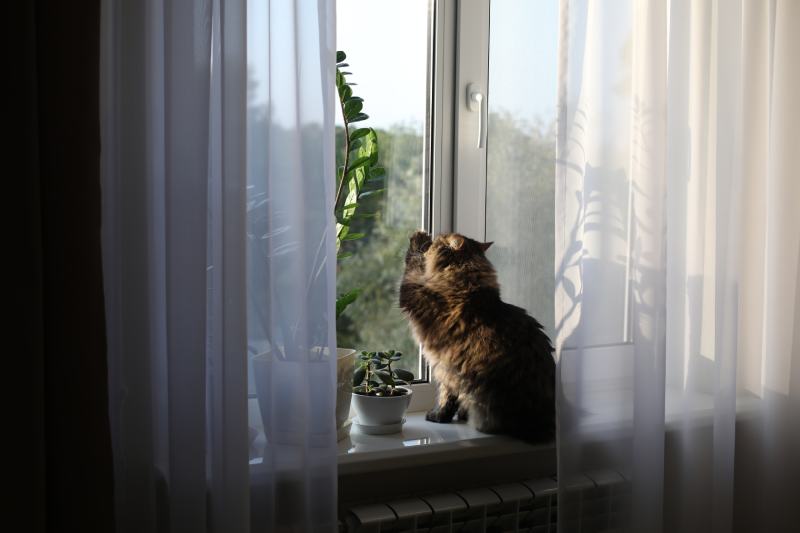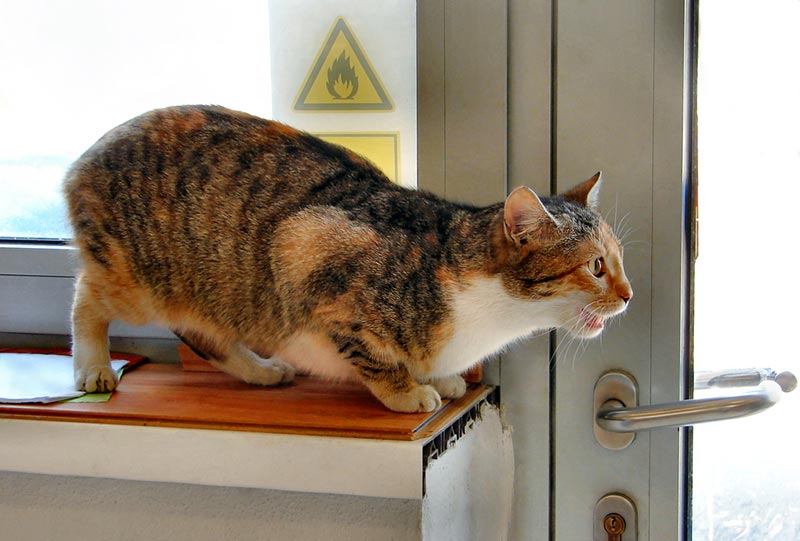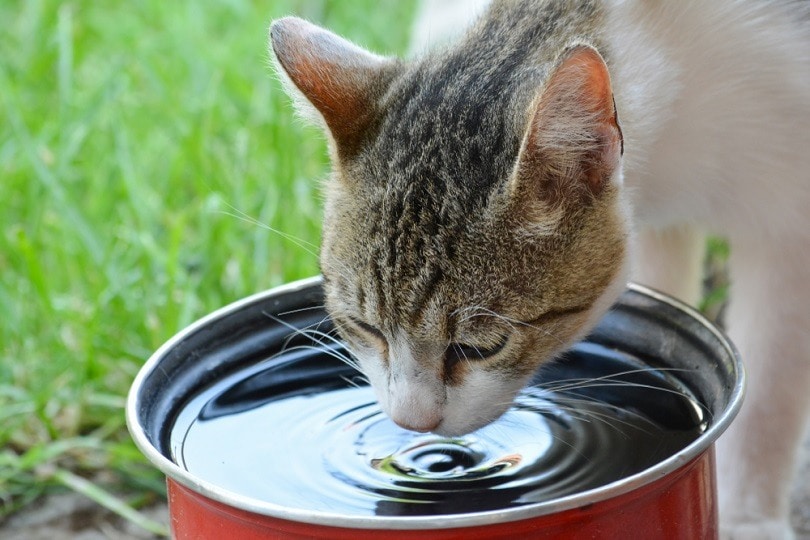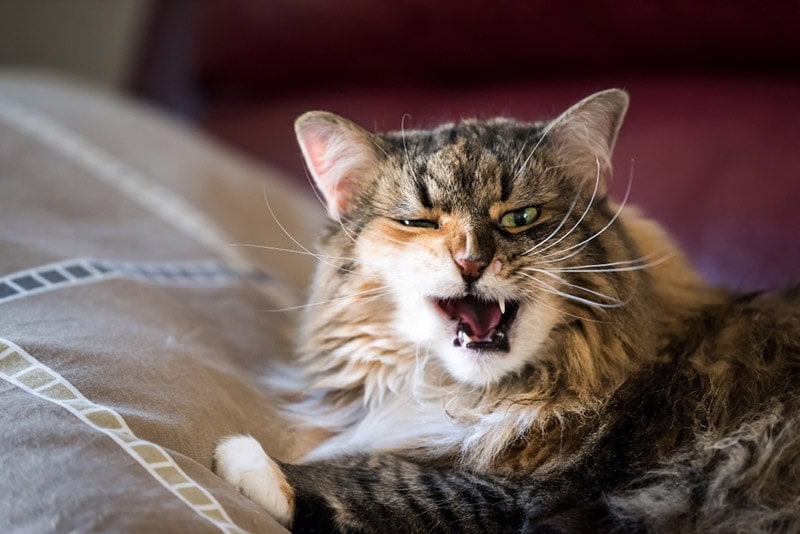
If your cat has started pacing, we totally get your concern—when it comes to our feline friends, anything that seems out of the ordinary can send us into a tailspin. Pacing in cats can happen for a number of reasons. Read on to learn what might be causing this behavior, so you can get your feline the help they need). Let’s explore why your cat may be pacing to help you get to the bottom of things.
The 10 Reasons Why Your Cat is Pacing All the Time
1. Boredom
Boredom is one reason that cats sometimes pace. If your kitty is lacking physical and/or mental stimulation, they might pace in an attempt to release some energy. Bored cats are also prone to destructive behaviors like scratching furniture.
Set aside some time every day for a few play sessions with your cat and give them some interactive toys when they’re in an active mood to refocus their energy. Cat trees placed by a window are also great for boredom as they give your cat a free, all-day cinema experience!
2. Excitement
If your cat is standing on the window ledge and pacing back and forth, they might be tantalized by something on the other side like a bird or a mouse. The pacing could be the result of frustration that they can’t get to whatever has caught their eye, and you may also hear them chirping or chattering excitedly.

3. Stress or Anxiety
Cats feeling stressed or anxious sometimes pace, possibly in an attempt to get rid of that pent-up energy or to self-soothe. You’d be surprised by the seemingly small things cats can get stressed out about—even switching the location of their food bowls or trying a different type of litter sends some cats off balance.
A stressful home environment is another cause, for example, if the home is noisy or children don’t respect the cat’s boundaries and treat them too roughly. Try to figure out what could be behind your cat’s stress and take steps to make their life more relaxing. If you’re concerned about feline anxiety, speak to your vet for advice.
4. Poisoning
Pacing is one of the signs of toxicosis, as this can affect the neurological system. Other signs a cat has ingested something toxic include drooling, twitching, breathing issues, skin swelling, vomiting, diarrhea, changes in eating, drinking, or bathroom habits, fitting, lethargy, depression, shock, and collapsing. Please contact your vet at once if you suspect poisoning.
Various household items are toxic to cats, including but not limited to antifreeze, insecticides, essential oils, weed killers, certain flowers and plants, and certain human foods. Flea and tick treatments can also cause toxicosis if ingested.

5. Feline Cognitive Dysfunction
Also known as “cat dementia”, feline cognitive dysfunction affects the neurological system, causing cats to struggle with memory, become less aware in general, and have a decreased ability to respond to stimuli. These cats can become disorientated, confused, and anxious, which could lead to pacing.
Other signs of feline cognitive dementia include excessive licking, irritability, forgetting house rules or training that they previously had no problems following, slow learning, incontinence, appetite loss, vocalizing more than usual, and changes in sleep. This condition is more common in senior cats.
6. Pregnancy & Heat Behavior
Unspayed cats may pace when they’re in heat. If your cat is in heat, she may also be more vocal, clingy, and/or irritable than usual. Pacing sometimes occurs when a cat is about to give birth, too, as they tend to become restless at this stage.

7. Liver Disease
Liver disease can also affect the brain—this is known as “hepatic encephalopathy”. If this happens, a cat may pace compulsively and show other signs like circling, disorientation, confusion after eating, bumping into walls, lethargy, wandering aimlessly, appetite loss, and becoming excessively vocal. It’s also possible for cats to become aggressive, drool, and experience vomiting and diarrhea.
8. Endocrine Diseases
Hyperthyroidism is an example of an endocrine disease that may cause restlessness in cats. Hyperthyroidism is a condition that causes there to be too much thyroxine (thyroid hormone) production.
If your cat has this disease, they may show other signs like weight loss, eating, drinking, and peeing more, vomiting, diarrhea, rapid breathing, hyperactivity, and looking generally unwell with an unkempt coat.

9. Tumors
A brain tumor or a tumor in another part of the body that has metastasized to the brain could cause your cat to pace due to the effects of the tumor. Disorientation, seizures, bumping into objects, ataxia (drunken gait), circling, vocalizing more than usual, and general behavior changes are other signs of tumors affecting the brain.
10. Pain & Injuries
If your cat has experienced a head injury, their nervous system may be affected, and pacing could be one of the effects. Pain can also cause pacing because it prevents your cat from being able to relax and makes them uncomfortable, so cats in pain sometimes become restless as a result.

FAQ
Is My Cat Sick or Just Bored?
A cat that is simply bored will typically seem otherwise healthy whereas sick cats may display other signs as well as pacing (for example, confusion, vomiting, diarrhea, bumping into objects, excessive vocalizing, and so forth).
Nevertheless, cats are tough animals and sometimes don’t show it when they’re feeling unwell, so don’t hesitate to reach out to your vet if you’re worried, just for peace of mind.
Why Is My Cat Pacing and Meowing?
Restlessness is common in unspayed or unneutered cats that are in heat or seeking a mate, especially since both genders become more prone to roaming during these periods. Stress and anxiety can also cause this behavior, as can a variety of medical conditions, so be on the lookout for other signs that your cat might be unwell. Ask your vet if you’re not sure.
Conclusion
There are many reasons that a cat might pace, ranging from common behavioral to life-threatening medical conditions. You know your cat best, so if you’re concerned by a change in their behavior or feel something is “off,” don’t hesitate to speak to your vet about the situation to get their input. Keep a note of all the changes so you can give your vet as much information as possible.
Featured Image Credit: Ishman000, Pixabay







